 Research Update
Research Update
19
June
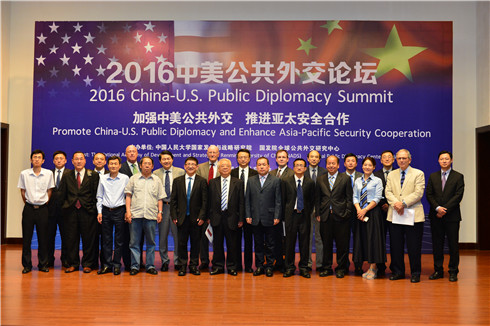
On June 19, “2016 China-U.S. Public Democracy Summit” was held at Renmin University of China (RUC). The summit, aimed at implementing the spirit of General Secretary Xi Jinping’s speech titled “Making Unremitting Efforts to Build New China-U.S. Relations” and high-level consultation spirit in economic dialogues and China-U.S. cultural exchanges, was hosted by National Academy of Development and Strategy (NADS), RUC, and co-organized by China Public Diplomacy Association.
The summit had in-depth discussions on issues such as how to promote China-U.S. strategic mutual trust through public diplomacy, how to strengthen the role of think tanks in China-U.S. relations and Asia-Pacific security cooperation, and how to enhance all-dimensional and multi-field public diplomacy exchanges and cooperation between China and the U.S. It invited over 30 famous experts and scholars from political, academic, think-tank strategy and media circles in China and the U.S., aiming at promoting China-U.S. strategic mutual trust and enhancing the construction of new China-U.S. relations and world peace and stability through exchanges and dialogues. Experts present expected to jointly boost the construction of new China-U.S. relations through exchanges and cooperation between China and the U.S. in the field of public diplomacy.
For both China and the U.S., China-U.S. relations are one of the most important bilateral relations. In September 2015, President Xi Jinping paid a state visit to the U.S. smoothly, which was summarized by Foreign Minister Wang Yi as “enhancing trust and reducing misgivings, focusing on cooperation, being people-first and future-oriented”. The idea highlights the important position of China-U.S. public diplomacy in respective roles under new circumstances in China.
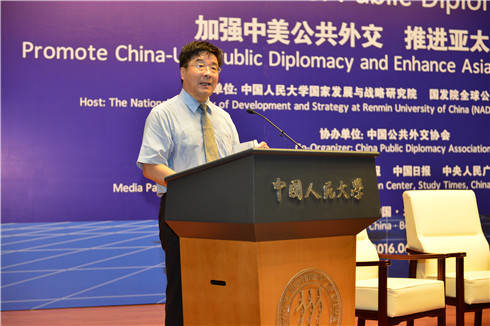
In the opening ceremony of the summit, Liu Wei, President of RUC and Dean of NADS, RUC, and Ma Zhengang, Vice Chairman of China Public Diplomacy Association and the former Deputy Director of Foreign Affairs Bureau of the State Council, extended on behalf of the host and co-organizer their respective warm welcome and heartfelt thanks to famous experts and scholars at home and abroad that were present. President Liu Wei said that China and the U.S. were two major powers in the world, by which the construction of a new international political and economic order would surely affect global economic development and social stability. Asia Pacific witnesses the densest interest crossing and the most frequent interaction between China and the U.S. while Asia-Pacific security and cooperation are the core intersections of Chinese and American influence on the world. Strategy circles in both China and the U.S. are in urgent need to construct new China-U.S. relations based on strategic mutual trust and win-win cooperation and enhance Asia-Pacific and even global cooperation and development through all-dimensional and effective public diplomacy.

Vice Chairman Ma Zhengang said that China-U.S. relations had developed by leaps and bounds, with cooperation between both parties in various fields reaching unprecedented breadth, depth and height, but were also confronted with conflicts and setbacks. With joint efforts of the two, the boat of China-U.S. relations sails forward zigzag despite of jolts and fluctuations. The two reached a consensus on co-construction of a new pattern of relationship between great powers at first, but they fail to stick to the direction all the time, of which the root cause is absence of strategic mutual trust between the two. At such a time, public diplomacy seems to be more important and necessary for promoting mutual understanding between China and the U.S. and enhancing mutual trust.
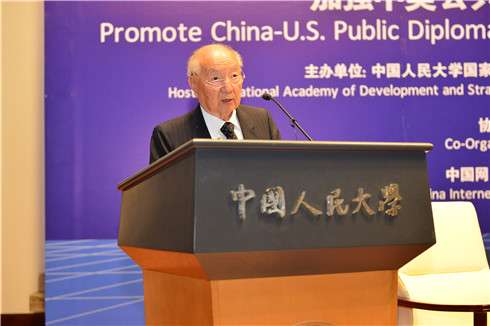
As is known, China and the United States are witnessing increasingly interwoven interests and cooperation in a wider range of areas. Therefore, the two should strengthen exchanges and communication based on mutual respect and equality, enhance coordination in respect of bilateral relations, major international and regional issues as well as response to global challenges and achieve inclusive cooperation. Eight experts and scholars represented by Li Daoyu, the former Chinese Ambassador to the U.S. and the United Nations delivered keynote speeches on China-U.S. relations, status quo of China-U.S. public diplomacy, ways of cooperation and development prospects first.
Ambassador Li Daoyu said in his speech that we always adhered to principles of equality, win-win cooperation and safeguarding national economic security and were willing to participate in various regional economic cooperation and exchange platforms or forums and many a time, we could exchange opinions with the U.S. by different means or via different platforms. Think tanks, inter-governmental bodies and business circles can all make positive contributions to economic development in Asia-Pacific, stable growth of world economy and Asia-Pacific and even world peace and security, which is a role that public diplomacy should also play in national strategic construction.
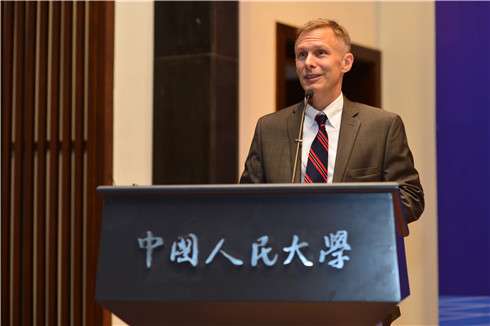
According to David Rank, Charge d’Affaires ad interim and Envoy at U.S. Embassy in China, China and the U.S. should further expand cooperation in science, technology, culture, education, sports and so on, and have made great progress in many fields in recent years. However, we should not neglect structural problems in bilateral relations and in order to solve these problems, experts and scholars in the field of public diplomacy should assume greater responsibilities. Long-term cooperation in public diplomacy between China and the U.S. is expected to have a bright future.

Douglas Paal, Vice President of Carnegie Endowment for International Peace pointed out that in the early stage after establishment of China-U.S. diplomatic relations, Kissinger and Regan had made great efforts to promote bilateral relations, but many practices in the past had become inapplicable. There are two main reasons: firstly, commentators are more commercial and are not strategic thinkers any longer, so readers lost trust in them. Secondly, in many cases, for example, some news media convey the information you desire instead of some objective information.
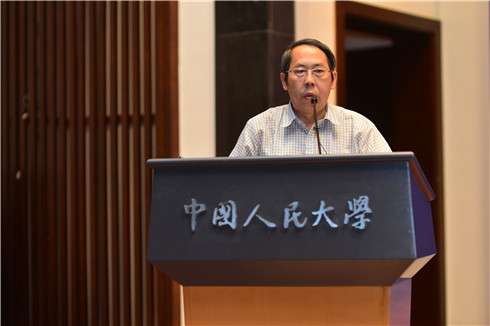
Shi Yinhong, Director of Center for American Studies, RUC and Counselor of the State Council, said that contemporary China was a great power with basic foreign needs in multiple respects, so foreign relations should not focus on the relations with the U.S. alone. To constantly increase friends, strategically neutral states and even strictly strategic partners far and near, and to reduce or conquer strategic rivals or strategic vassals of the U.S. that neighbor China will greatly help China’s prolonged efforts to persuade and force the U.S. to make a concession.

Li Cheng, Director of John L. Thornton China Center, The Brookings Institution, said that if economic interdependence between China and the U.S. was considered as the “ballast” of bilateral relations between the two and China-U.S. academic exchanges as the “coordinatograph” for development of bilateral relations, then think-tank communication between the two could be regarded as the “alarm”, “buffer” and “decompressor”. China-U.S. think-tank cooperation and exchanges play a key role in dealing with misunderstandings, misreading and misjudgments between China and the U.S.. China is witnessing rapid development of think tanks, in which formalism, inefficiency and similarity are inevitable, but the overall development is historical and prospective. Whilst studying and expounding national interests, Chinese think tanks should not neglect rationally and effectively conveying Chinese values and attitude toward universal values.

Prof. Gao Bai from Duke University analyzed and indicated that the current two reversals would have huge impact on international politics and economy. Firstly, globalization is changing its direction from release of market forces to protection of society; secondly, public sentiment in the U.S. begins to shift from liberal international order to isolationist one. If growing naturally, the two reversals will bring a lot of risks to the world. Think tanks in the two countries have to jump out of the current restrictions of coming up with strategies only for the game in bilateral relations, have a clear understanding of common challenges in the face of the two countries and provide constructive policy options for their own governments and the public.

Executive Dean Liu Yuanchun of NADS, RUC said that an important standpoint of the NADS was its thinking power, its think-tank studies and its dependence on preponderant disciplines of RUC to bring a number of creative and exploring scholars to the platform through construction of relevant mechanisms and systems to carry out multi-field think-tank studies. Last year should be a very important time point for China-U.S. economy, of which the first sign is that China has surpassed Canada to become America’s largest trading partner. The second most important sign is that China-U.S. trade deficit has set another record, bringing trade conflicts between the two to a record high in recent years. Therefore, China and the U.S. have to create a better cooperating mechanism in economic exchanges and advocate setting up the value idea of community of common destiny in the context of global crisis.

Deputy Dean Wang Lili of NADS, RUC said that China and the U.S., as two vital powers in today’s world, have integrated interests, so the two should not choose to be enemies, but to be partners, as the huge space of cooperation between China and the U.S. is more beneficial to global interests. In the face of various uncertain factors in current international relations, all countries require more positive cooperation between China and the U.S. and expect that the two can establish more strategic and prospective relations. To this end, we have to provide strategic thinking support and establish a good public opinion environment for the formation of new China-U.S. relations through exchanges, dialogues and collaboration between strategy circles in the two countries, so as to create Asia-Pacific and even global peace and stability.
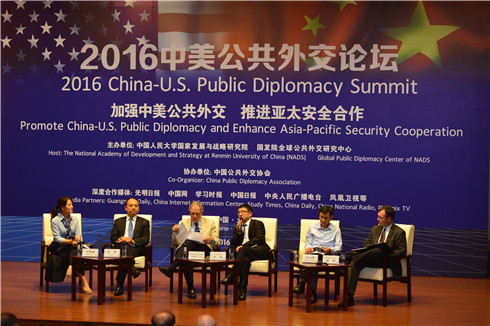
The first stage of the seminar focused on the issue of “enhancing all-dimensional and multi-field China-U.S. public diplomacy”, which was presided over by Deputy Dean Wang Lili of NADS, RUC, and participated by experts including Jerrold Green, President of Pacific Council on International Policy, Li Cheng, Director of John L. Thornton China Center, The Brookings Institution, Robert Daly, Director of Kissinger Institute on China and the United States, Woodrow Wilson International Center for Scholars, Guan Xinguo, Director of Overseas Department of the Xinhua News Agency and Qi Ye, Director of Brookings-Tsinghua Center for Public Policy.
Jerrold Green said that China and the U.S. were strongly associated with each other in such fields as culture, education, economy and trade and a lot of U.S. think tanks had branches in China, so Chinese think tanks were recommended to establish branches in the U.S. to promote collaboration.
Qi Ye said that cooperation in the field of climate change was a successful example of China and the U.S. in the field of public diplomacy, and the four meetings and four conclusions of agreements were unprecedented in the diplomatic history of China and the U.S., so were frequent high-level, unidirectional and single-issue visits paid by the U.S. to China in 2009.
Li Cheng said that where new media played an increasingly important role, the media and think tanks should have voices of reason more than ever to be adapted to the existing pluralistic platform, carry out rational discussions and be more aware of responsibilities they shoulder.
Guan Xinguo said that Chinese media should fully and objectively report to the American people about China’s development and the orientation of China’s future policies; meanwhile, it was also responsible for introducing politics, economic development and social problems in the U.S. to the audience in China and all over the world in a timely, objective and comprehensively manner.
Robert Daly said that public diplomacy played a key role in promoting non-governmental communication and, most importantly, the two should open more areas and space to allow China to have more voices in the U.S.

The second stage of the seminar focused on the issue of “promoting the role of think tanks in China-U.S. relations and Asia-Pacific security cooperation”, which was presided over by Liu Yutong, Secretary General of China Public Diplomacy Association, and participated by experts including Robert Kapp, the former President of the US-China Business Council, Liu Yawei, Director of Chinese Projects at Carter Center, Jia Qingguo, Dean of School of International Studies, Peking University and a member of Foreign Affairs Committee of the Chinese People’s Political Consultative Conference, Wang Huiyao, President of Center for China and Globalization and Counselor of the State Council, and Zhao Xiaozhuo, Director of Research Center for China-U.S. Defense Relations, Academy of Military Sciences PLA China.
Secretary General Liu Yutong believed that Chinese and American think tanks had a lot to do in respect of public diplomacy and were of great significance to promoting long-term development of China-U.S. relations; special attention should be paid to exchanges between Chinese and American students, so as to remove barriers to cognition of the history of each other by the young and comprehensively and objectively expound the history of the two countries.
Robert Kapp said that China and the U.S. should enhance information communication to allow both parties to have more channels and resources to have a deep understanding of the history and present status of the two countries.
Liu Yawei believed that people should correct their misunderstandings of think tanks and have a correct understanding that think tanks are non-governmental and independent.
Jia Qingguo suggested that think tanks discuss policy issues from different perspectives, which helped generation of multi-dimensional thinking about problems, so that the government could have more comprehensive and in-depth considerations on relevant problems before making policies, reflect and surpass the inertial thinking of authorities after policies were made.
Zhao Xiaozhuo said that the past three years had seen significant progress in China-U.S. military relations, with some being substantial, because, on the one hand, President Xi proposed to construct new China-U.S. relations and military relations while the U.S. deemed that communication, exchanges and cooperation between the two conformed to the benefits of the two; on the other hand, think tanks should have voices of reason and make use of their good knowledge reserve and academic quality to promote communication and exchanges between the two in the field of security.
Wang Huiyao said that China-U.S. public diplomacy was highlighted by cultural exchanges, especially exchanges of overseas students, which represented a force of stability, peace, understanding and mutual communication in China-U.S. relations and should be a focus of future think-tank exchanges.
China-U.S. Public Democracy Summit, as a yearly think-tank forum for China-U.S. cultural exchanges, is a high-level forum built by NADS, RUC. The summit invited many famous experts and scholars from Chinese and U.S. think tanks and academia such as China Public Diplomacy Association, Carnegie Endowment for International Peace, The Brookings Institution, Pacific Council on International Policy, Woodrow Wilson International Center for Scholars, Carter Center, China Institutes of Contemporary International Relations, Peking University, Chinese Academy of Social Sciences, Shanghai Academy of Social Sciences, Academy of Military Sciences, Brookings-Tsinghua Center for Public Policy and Center for China and Globalization for discussion, aiming at promoting China-U.S. strategic mutual trust and enhancing construction and stability of new China-U.S. relations through exchanges and dialogues.
NADS is a new think tank with Chinese characteristics built by RUC upon integration of its excellent intellectual resources. Since its establishment, it has been focusing on three core research areas, including economic governance and economic development, political governance and rule of law construction, social governance and social innovation, with the goal of “national strategy, global vision, decision-making consultation and public opinion guidance”, carrying out studies on policy and strategy centering on urgent problems faced by China and the world at present, and striving to provide high-level intellectual support for scientific policy-making by the Party and the country. At present, NADS, RUC has a dozen of characteristic research teams, such as China Macro Economy Forum, The Institute of State Governance, Anti-corruption and New Political Economics Research Center, Global Public Diplomacy Research Center, and ten think-tank products, and has submitted nearly 300 various decision-making consultation results to the Party and the country, among which many have been approved by national leaders and nearly one hundred results and suggestions have been taken by provincial departments and above, including the Propaganda Department of the Central Committee of the CPC, National Development and Reform Commission, Ministry of Foreign Affairs, Ministry of Education, and National Health and Family Planning Commission. Quite a few experts and scholars have repeatedly participated in “High-level Decision-Making Consultation Meeting” and similar activities, where they directly expressed their opinions, provided advices and suggestions and participated in decision-making.